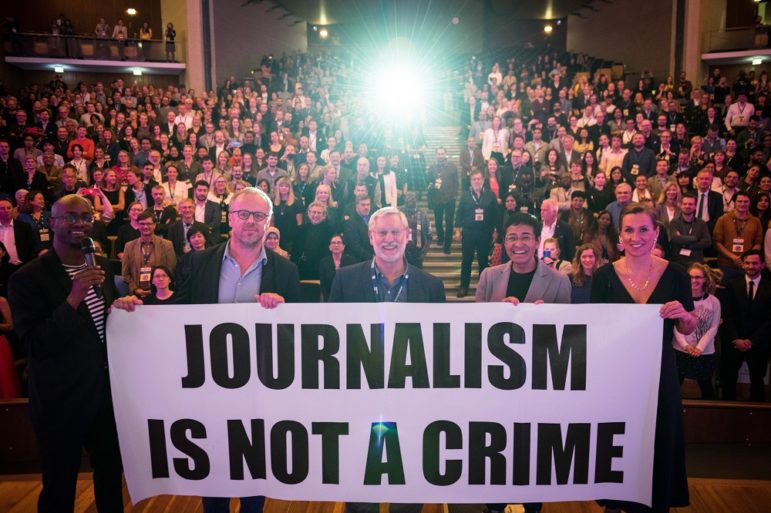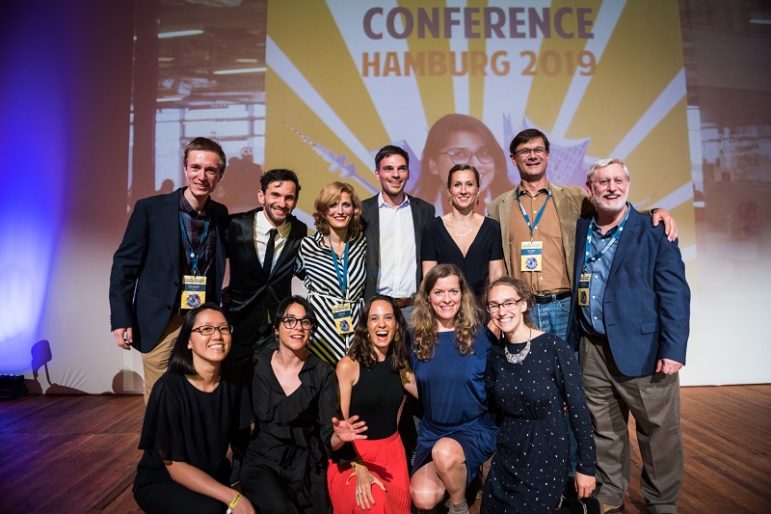
Global Investigative Journalism Conference in Hamburg 25. – 29.09.2019 Copyright: Nick Jaussi / nickjaussi.com
Experiencing major withdrawal symptoms now that the 11th Global Investigative Journalism Conference is over? You’re not alone. Over the past four days, over 1,700 journalists from 130 countries gathered in Hamburg, Germany, to share experiences, learn from expert speakers, network with kindred spirits, and find new partners for their next investigations. It was the most diverse and largest-ever international gathering of investigative journalists, and a perfect place to be inspired.
Since 2001, the global conferences have been a unique petri dish for collaboration. Instead of competing with each other, working together has never been more important for newsrooms than in this time when corruption transcends borders, illicit money flows freely through offshore channels and disinformation campaigns are replicated and adapted across countries.
In her speech, keynote speaker Maria Ressa, from Philippines’ Rappler, hit the nail on the head by urging the crowd of investigative journalists at GIJC19 to “Collaborate, collaborate, collaborate!” There were so many highlights during this intensive conference that it’s difficult to sum them all up but we’ll hazard an attempt here.
Key: Collaborate Instead of Compete
Collaboration was the buzzword at GIJC19. With 130 nations represented at the conference, journalists digging into trans-border crime had ample opportunity to find reporting partners in the countries where their investigations extended to.
“If you’re a journalist and you’re not collaborating with other journalists from other orgs you’re far far behind” Drew Sullivan @OCCRP #GIJC19 #GIJC2019 pic.twitter.com/aq1aohFtBh
— aliaibrahim عليا ابراهيم (@aliaibrahim74) September 26, 2019
Women Muckrakers in Full Force
There was no shortage of courageous women muckrakers at GIJC19; 48% of speakers and 50% of attendees were women. We organized 13 topical networking sessions, ranging from environmental to women, and disinformation to exiled media. We also put together a powerful, all-female panel featuring Martha Mendoza, Patricia Evangelista, Minna Knus-Galan, Marcela Turati, Miranda Patrucic, Juliane Löffler, Shiori Ito, Oriana Zill, Asha Mwilu, Alejandra Xanic VB, and Sheila Coronel, that encouraged other women journalists with their personal stories and survival strategies.
What a privilege to moderate a panel of brilliant & brave women muckrakers. I am inspired and in awe of my sisters #GIJC2019 #GIJC19! https://t.co/7lY7mRXWlC
— Sheila Coronel (@SheilaCoronel) September 28, 2019
Trauma Sharing
GIJC19 not only brought together investigative journalists who work in the most restrictive environments but also those from countries with relatively free press to share their reporting hurdles, harrowing experiences, and self-care tips. From investigating the murder of a colleague to uncovering mass killings, the topics covered were challenging, but necessary.
Burmese journalist Swe Win, one the best and bravest practitioners of our trade, speaking at #GIJC19 about the risks of publishing hard-hitting work in Myanmar: “We always feel like we’re walking close to the prison gate when we publish a sensitive story.” @gijn pic.twitter.com/LR1ZEwOAyY
— Andrew RC Marshall (@Journotopia) September 27, 2019
OSINT
With so much data publicly available on the web, advanced online research techniques are becoming an essential tool in an investigative journalist’s toolbox. Expert online sleuths Paul Myers and Henk van Ess taught GIJC19 attendees tricks to find information on social media for investigations. We also had the Quiztime crew put journalists’ geolocation skills to the test.
With my best friend in search, last Friday at #GIJC19 : the brilliant @PaulMyersBBC, check out his https://t.co/RxxcdrzvWi pic.twitter.com/2B5Ly42PJb
— ʜᴇɴᴋ ᴠᴀɴ ᴇss (@henkvaness) September 29, 2019
Mobile Journalism
These days, a smartphone is all a journalist needs to produce good video journalism. Our team of mobile journalism reporters, consisting of Konrad Adenauer Stiftung fellows, were roaming the conference venues — Hafencity University, Der Spiegel, MS Stubnitz, University of Hamburg and Designxport — to grab interviews and share interesting tidbits. Check out their work and videos on GIJN’s Instagram. Want to know what apps they used? The answer is here.
Welcome to Hamburg! #GIJC19 kicks off with several pre-conference workshops conducted by @PaulMyersBBC, @DartCenter & @CFImedias. Our social video team (pictured here) will bring you the latest conference happenings on Instagram. Follow here: https://t.co/3DjoLkhGy4 @JONAkademie pic.twitter.com/iLCl9sZjD5
— GIJN (@gijn) September 25, 2019
I have now found out the apps they're using – FilmicPro, Adobe Rush, Spark Post and Canva (for cards)
— Marc Blank-Settle (@MarcSettle) September 27, 2019
Citizen, Indigenous, and Exiled Journalists
GIJC19 included special tracks, workshops, meet-ups, and guides for citizen journalists, indigenous journalists and exiled journalists thanks to the support of our sponsors and partners — DigLab Foundation, Native American Journalists Association, and Körber-Stiftung. See GIJN’s Citizen Investigations Resource and Guide for Indigenous Investigative Journalists.
I am honoured to have spent the afternoon in a room filled with #Indigenous #journalists @Tahtone @connie_walker @TrinaRoache @alisonaher @DiinSilversmith @raschie just to name a few #wordwarriors 👊🏻#GIJC19 pic.twitter.com/FPK8ddbrD2
— FrancineCompton (@FrancineCompton) September 25, 2019
The first day of #GIJC19 already brought great discussions and insight to different aspects of #exilemedia. In case you missed last night's panel on Saudi Arabia, you can watch it here: https://t.co/brfUyeYsAy pic.twitter.com/LEzS0z2QdX
— KoerberGesellschaft (@KoerberLBG) September 27, 2019
Project asks citizens to photograph mysterious unfinished projects across Kyrgyzstan, helping journalists investigate shady public contracts- @Rinatius Pictured here: a school and village monument. We could definitely use this in Lebanon! #GIJC19 pic.twitter.com/tcHzlDzM9H
— Habib Battah (@habib_b) September 27, 2019
Online Documentary Festival
We also partnered with DIG Awards to create an online documentary festival, allowing attendees exclusive access to watch award-winning videos from the DIG Awards, as well as one-on-one mentoring for documentary projects.
It was a first and worked magic! #MeetTheMentor the .@gijn one-on-one mentorship session on investigative docs. Many thanks @BlaisClaudine @julianaruhfus Nils Hanson Jean-Philippe Ceppi @marcperky @martherubio pic.twitter.com/g3E0obfuMH
— Serena Tinari (@serenatinari) September 29, 2019
Digging Into Data
Journalists at the conference were hungry to learn about everything dealing with data, from scraping and creating databases to producing data visualizations. Over 60 out of more than 250 panels, workshops, meet-ups, and special events focused on various aspects of data journalism.
A workshop on nerdy databases useful for investigations – on a boat! Yeeeah pretty much my thing 🙌☺️ #GIJC19 pic.twitter.com/HB5kFmKDaC
— Fiona Endres (@FionaEndres) September 26, 2019
Investigating Disinformation
How can journalists deal with or cover online disinformation campaigns affecting their country’s democracy and elections? This was a topic of concern for many at GIJC19 and they were looking to each other for ideas on how to identify disinformation and its sources, and how to gather and analyze data to report on it.
The fifth point of this slide is the most important: identifying disinformation is the (relatively) easy bit. Attributing who’s behind it is really hard – and jumping to conclusions makes you part of the problem. #GIJC19 pic.twitter.com/Quq5ZSSebz
— James Ball (@jamesrbuk) September 28, 2019
GIJC19’s International Newsroom
With a team of more than 50 journalists, photographers, videographers, and an illustrator from 30 countries, our newsroom was producing coverage of the conference in eight languages. We’ve got articles on the conference site, Instagram stories, and content on numerous social media platforms. Looking for speakers’ tipsheets? Find them here.
The first day of the actual conference starts today with a meeting of the very international news team that will cover the @gijn conference. #GIJC19 pic.twitter.com/zRk9mBL0PQ
— WytseVellinga -#storytelling trainer (@WytseVellinga) September 25, 2019
#HoldTheLine
Before Maria Ressa, a 2018 TIME Person of the Year, had even begun her keynote, a prolonged standing ovation by a packed hall of investigative journalists brought her to tears. She addressed her similarly inspiring and courageous colleagues, saying: “Power — and bullies — will never stop if you give in to them. We need to seriously come together because an attack on one is an attack on all.”
“An attack on 1 is an attack on all”: an emotional @mariaressa addresses hundreds of investigative journalists at #GIJC19 and encourages to fight for truth. “If we don’t take the right step forward democracy is dead.” #pressfreedom pic.twitter.com/XHR7OVLlno
— Scilla Alecci (@shirafu) September 28, 2019
Global Shining Light Award Winners
This year’s Global Shining Light Award were divided into two categories: small/medium outlets, and large outlets. The winners included IDL Reporteros’ stories on Latin American corruption, Rappler’s coverage of extrajudicial killings in the Philippines, and the #GuptaLeaks exposé by Daily Maverick, AmaBhungane, Open Up SA, News24, and Finance Uncovered. In addition, Africa Uncensored and the Organized Crime and Corruption Reporting project in collaboration with international media partners received citations of excellence.
Congrats to all #GIJC19 Global Shining Light Award winners @IDL_R, @rapplerdotcom & #GuptaLeaks team @dailymaverick, @amaBhungane, @OpenUpSA @News24 & @FinUncovered + Citation of Excellence recipients @AfUncensored; @OCCRP in collaboration with other media https://t.co/OZCXK6cbXA pic.twitter.com/n942lceuxC
— GIJN (@gijn) September 28, 2019
Many thanks to our co-hosts Netzwerk Recherche and Interlink Academy, as well as our sponsors, partners, member organizations, speakers, moderators, and all GIJC19 attendees for making this conference such a success. Till we meet again at the next conference!

GIJC19 co-hosts: GIJN, Netzwerk Recherche and Interlink Academy. Copyright: Nick Jaussi / nickjaussi.com
 Eunice Au is program coordinator with the Global Investigative Journalism Network. She was previously Malaysia correspondent for Singapore’s The Straits Times and a general beat reporter for Malaysia’s New Straits Times.
Eunice Au is program coordinator with the Global Investigative Journalism Network. She was previously Malaysia correspondent for Singapore’s The Straits Times and a general beat reporter for Malaysia’s New Straits Times.
